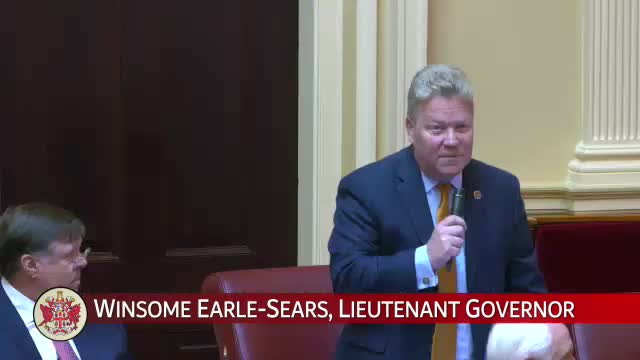Senate majority declares passage of HJ6006 after dispute over two-thirds requirement
Get AI-powered insights, summaries, and transcripts
Subscribe
Summary
RICHMOND, Oct. 29, 2025 — The Senate of Virginia moved through a daylong procedural fight over House Joint Resolution 6,006 that ended with the Senate majority directing the clerk to record the resolution as passed despite an earlier roll call that showed the measure had failed.
RICHMOND, Oct. 29, 2025 — The Senate of Virginia moved through a daylong procedural fight over House Joint Resolution 6,006 that ended with the Senate majority directing the clerk to record the resolution as passed despite an earlier roll call that showed the measure had failed.
HJ6006, described on the Senate calendar as a joint resolution "relating to the scope of business that may come before the 2024 special session," was placed before the Senate by Senator Locke of Hampton, who moved that the measure be agreed to. Two floor amendments offered by Senator Peake of Lynchburg would have added statements condemning political violence; Peake said the amendments were intended to "condemn political violence" and to make "a statement that we condemn political violence by anyone and everyone." The Senate twice took recorded roll calls on those amendments. Amendment 1 failed on the roll call (ayes 17, noes 21). Amendment 2 also failed on a recorded roll call after an initial voice announcement (ayes 18, noes 19).
The debate shifted from the amendment language to a constitutional and parliamentary question: whether a joint resolution that would change the scope of a governor-called special session to include redistricting requires a two-thirds vote of the chamber. The presiding officer (addressed in the transcript as "Madam President") ruled that, under the chair's reading of the Virginia Constitution and the governor's proclamation calling the special session, a two-thirds affirmative vote is required for a joint resolution related to redistricting during the special session.
That ruling prompted multiple points of order, motions to adjourn and appeals of the chair's ruling. Senator Sarravel of Eastern Fairfax County repeatedly led the effort to limit debate and to challenge the chair's ruling, arguing the Senate has authority to set its own procedural scope and that prior special-session practice had permitted similar procedural changes without a two-thirds margin. In a lengthy explanation, the presiding officer cited Article 4 of the Virginia Constitution and said, "it is the ruling of the chair that under the constitution of Virginia, the passage of a joint resolution relating to redistricting during this special session requires the affirmative vote of two-thirds of the members elected to each house."
The Senate then voted on whether to sustain the chair's ruling; that appeal vote failed to sustain the ruling (the roll call recorded 17 in favor of sustaining, 21 opposed). Following that vote, the majority directed the clerk to record HJ6006 as passed. The clerk confirmed the journal will reflect that the resolution passed. The presiding officer noted that the chair's earlier constitutional interpretation remained on the record.
Throughout debate senators on both sides invoked recent acts of political violence and the January 6, 2021, attack on the U.S. Capitol. Senator Peake said, "We cannot have those individuals expressing thoughts of death and violence to their political opponents." Opponents of the amendments said the subject matter and timing were not appropriate for the special session and raised concerns about partisan timing ahead of an election.
There were several recorded roll calls during the proceeding: the Senate voted to waive reading of certain materials (ayes 21, noes 17); amendment 1 failed (ayes 17, noes 21); amendment 2 failed on a recorded roll (ayes 18, noes 19); an initial roll on HJ6006 showed ayes 21, noes 17 (the presiding officer announced the resolution failed based on her constitutional reading); and the subsequent appeal of the chair's ruling was not sustained (17 in favor of sustaining, 21 opposed). After the appeal vote, senators in the majority announced that HJ6006 had passed and the clerk said the journal will reflect passage.
The Senate later adopted Senate Resolution 700, a memorial resolution, and recessed until 3:30 p.m.
The sequence produced conflicting formal statements on the record: the presiding officer maintained the chair's constitutional interpretation about the two-thirds threshold, while the Senate majority voted not to sustain that ruling and instructed the clerk to record HJ6006 as passed. The clerk confirmed the journal will show the resolution as passed.
What happened next may be subject to further procedural steps, committee action in the House or judicial review; the presiding officer cautioned that the chair's constitutional interpretation remains on the record.
